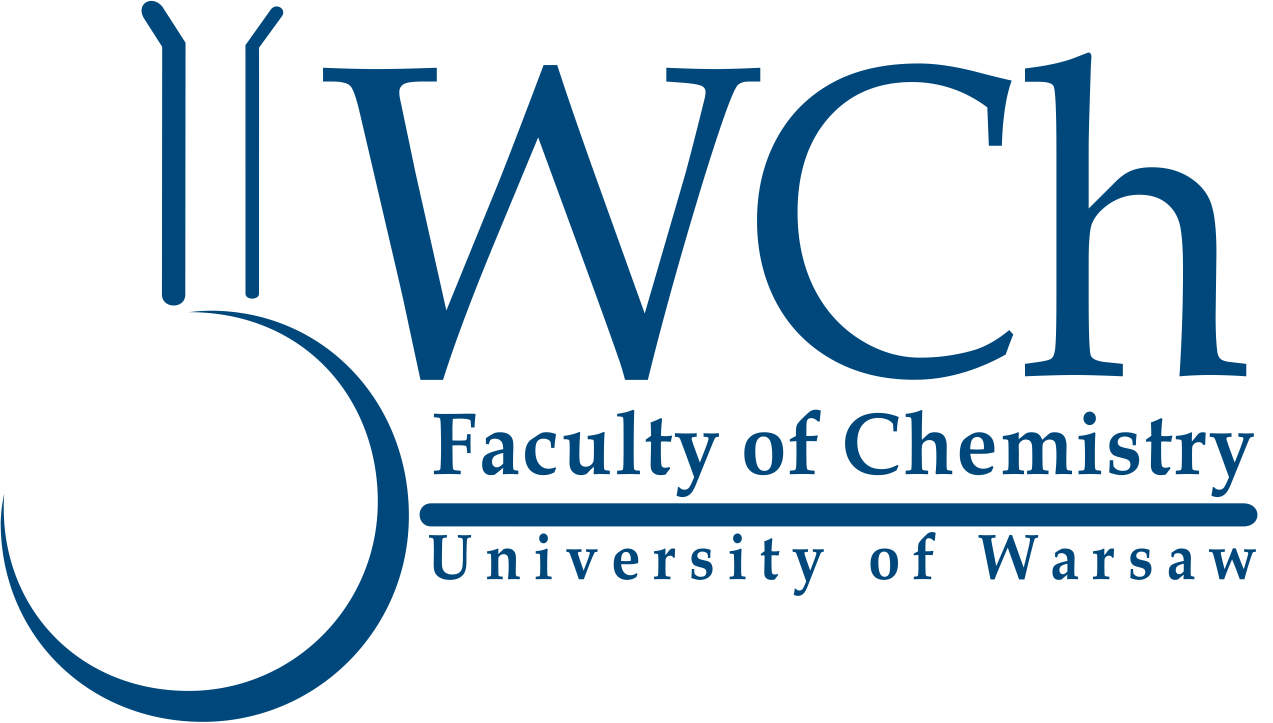Courses – Winter semester
In the case of too few students enrolled in subjects selected by incoming students from the list given below for Winter semesters, the Faculty of Chemistry reserves the right to propose substitutes for these classes.
The Faculty of Chemistry of the University of Warsaw conducts classes on similar topics in other fields of study apart from the field of Chemistry, therefore the choice of the substitutes should be made together with the coordinator/tutor from the Faculty of Chemistry.
Below is information about the fields of study and levels at the Faculty of Chemistry, where classes on similar topics are conducted:
Chemistry – Bachelor, Master
Medical Chemistry – Bachelor, Master
Chemical Instrumental Analysis – Bachelor
Applied Chemistry – Master
Nuclear Chemistry and Radiopharmaceutical – Bachelor
Radiogenomics – Master
♦ Molecular modeling – lecture; 1,5 ECTS
dr hab. Dominik Gront, prof. ucz. (dgront@chem.uw.edu.pl)
♦ Organic synthesis – laboratory; 6,0 ECTS
prof. dr hab. Tomasz Bauer (tbauer@chem.uw.edu.pl)
♦ Trace analysis of the organic pollutants in the environment; 3,0 ECTS
prof. dr hab. Tomasz Gierczak (gierczak@chem.uw.edu.pl)
♦ Fundamentals of chemical technology and chemicals management – lecture and laboratory; 8,0 ECTS
dr Hanna Wilczura-Wachnik (wilczura@chem.uw.edu.pl)
♦ Environmental analysis – lecture and laboratory; 4,5 ECTS
prof. dr hab. Beata Krasnodębska-Ostręga (bekras@chem.uw.edu.pl)
♦ Atomic spectrometry – lecture; 1,0 ECTS
prof. dr hab. Ewa Bulska (ebulska@chem.uw.edu.pl)
♦ Organic chemistry – lecture; 4,5 ECTS
prof. dr hab. Tomasz Bauer (tbauer@chem.uw.edu.pl)
♦ Advanced organic chemistry – lecture; 3,0 ECTS
prof. dr hab. Tomasz Bauer (tbauer@chem.uw.edu.pl)
♦ Physical chemistry – laboratory; level A – 3,0 ECTS; level B – 6,0 ECTS
dr Iwona Paleska (ipaleska@chem.uw.edu.pl)
♦ Physical chemistry – lecture; 3,0 ECTS
prof. dr hab. Magdalena Skompska (mskomps@chem.uw.edu.pl), prof. dr hab. Paweł Krysiński (pakrys@chem.uw.edu.pl)
♦ Physicochemistry of new materials – lecture; 3,0 ECTS
prof. dr hab. Robert Szoszkiewicz (rszoszkiewicz@chem.uw.edu.pl)
♦ Advanced techniques in infrared spectroscopy – lecture; 1,5 ECTS
prof. dr hab. Barbara Pałys (bpalys@chem.uw.edu.pl)
♦ Marine microplastics: from the anthropogenic litter to the plastispher – lecture; 1,5 ECTS
dr Agnieszka Dąbrowska (adabrowska@chem.uw.edu.pl)
♦ General physics 1 – lecture and laboratory; 6,0 ECTS
prof. dr hab. Robert Szoszkiewicz (rszoszkiewicz@chem.uw.edu.pl)
♦ „Nuclear chemistry” – laboratory; 2,0 ECTS
dr Anna Makowska (milew@chem.uw.edu.pl)
♦ Liquid Chromatography – laboratory; 3,5 ECTS
prof. dr hab. Magdalena Biesaga (mbiesaga@chem.uw.edu.pl)
♦ Crystallography A – lecture; 1,0 ECTS; laboratory 2,0 ECTS
prof. dr hab. Michał K. Cyrański (mkc@chem.uw.edu.pl)
♦ Crystallography B – lecture; 3,0 ECTS; laboratory; 3,0 ECTS; tutorials; 3,0 ECTS
prof. dr hab. Krzysztof Woźniak (kwozniak@chem.uw.edu.pl); dr hab. Anna Makal, prof. ucz. (amakal@chem.uw.edu.pl); prof. dr hab. Paulina Dominiak (pdomin@chem.uw.edu.pl)
♦ Principles of stereochemistry – lecture; 2,0 ECTS
dr Anna Zawadzka (azawadzka@chem.uw.edu.pl)
♦ General Chemistry – lecture; 6 ECTS; seminar; 4,5 ECST; laboratory; 2,0 ECTS or 3,5 ECTS
prof. dr hab. Zbigniew Stojek (stojek@chem.uw.edu.pl), dr Joanna Kowalska (askow@chem.uw.edu.pl)
♦ Separation of speciation forms of (potentially toxic) elements using different types of extraction techniques in environmental analysis – project; 9,0 ECTS
prof. dr hab. Beata Krasnodębska-Ostręga (bekras@chem.uw.edu.pl), dr Katarzyna Kińska (kkinska@chem.uw.edu.pl)
